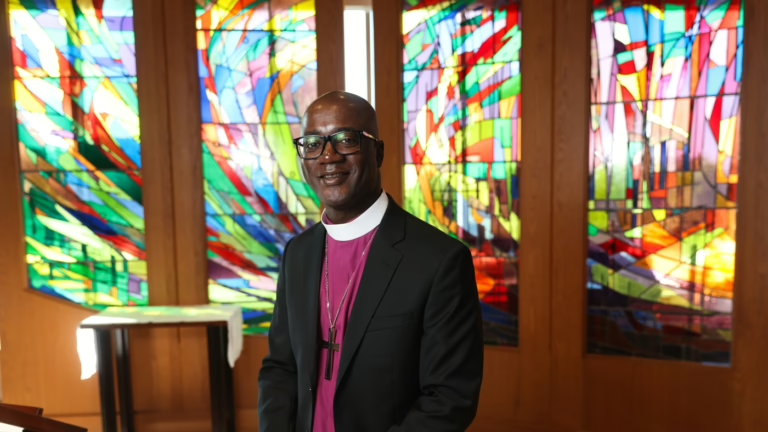Bishop Yehiel Curry, recently appointed as the first Black presiding bishop of the Evangelical Lutheran Church in America (ELCA), pictured Friday, Sept. 26, 2025, in Chicago.
Talia Sprague/AP
On Saturday, the Evangelical Lutheran Church in America (ELCA) marked a historic milestone by installing the Rev. Yehiel Curry as its first Black presiding bishop, a significant breakthrough for a denomination traditionally dominated by white members.
Reflecting on his groundbreaking election, Curry shared with The Associated Press just days before his church-england-first-female-archbishop-canterbury/” title=”Historic Milestone: … of England Appoints Its First Female Archbishop of Canterbury”>formal installation, “It still hasn’t fully sunk in-the reality of being the first.”
He follows the leadership of Rev. Elizabeth Eaton, who made history herself as the ELCA’s first female presiding bishop, serving for 12 years.
During Eaton’s leadership, Curry observed a notable shift in the ELCA’s conference of bishops, transitioning from a male majority to a female majority.
“Her leadership made a difference,” Curry noted. “I’m optimistic that this visibility will pave the way for more leaders of color to emerge.”
The official installation ceremony took place at Central Lutheran Church in Minneapolis, marking the start of Curry’s six-year term on October 1. His election occurred earlier that summer at the ELCA Churchwide Assembly held in Phoenix on July 30.
American Lutheranism is often associated with its Scandinavian and German heritage, particularly concentrated in the upper Midwest. The ELCA’s membership remains predominantly white-exceeding 95% by some estimates. Nevertheless, the denomination has actively supported congregations of color and multicultural ministries, while fostering connections with rapidly expanding Lutheran communities worldwide.
“Representing a largely white denomination as a Black man from the U.S. is an immense responsibility,” said Rev. Leila Ortiz, a close colleague and former ELCA bishop of the Metropolitan Washington, D.C., Synod. “I have faith in him and in God, and I eagerly anticipate his leadership.”
As the head of the largest Lutheran body in the United States, Curry faces challenges familiar to many mainline Protestant churches, including theological debates over LGBTQ+ inclusion and significant declines in membership. Since 1988, ELCA membership has dropped from 5.3 million to approximately 2.7 million today.
The ELCA has been progressive on LGBTQ+ issues, having authorized blessings of same-sex marriages since 2009 and welcoming LGBTQ+ clergy. The denomination appointed its first openly gay regional bishop in 2013 and its first openly transgender regional bishop in 2021.
At 53 years old, Curry is the fifth presiding bishop since the ELCA’s formation in 1988 through a merger of Lutheran bodies. Prior to his election, he served as one of 65 synod bishops, leading the Metropolitan Chicago Synod, where the ELCA’s headquarters are located.
An Unconventional Journey to Lutheran Leadership
Raised as the seventh of eleven siblings on Chicago’s South Side, Curry was brought up in the Catholic tradition and attended Catholic schools through college. Before entering ministry, he worked as a social worker and later as a public school teacher.
In his mid-twenties, Curry and his wife discovered Shekinah Chapel, a nascent congregation in Chicago. “I hadn’t realized it was part of a Lutheran church at first,” he recalled.
The church offered a mentorship program for young Black men and boys, which Curry saw as a valuable resource for some of his middle school students.
“It felt like a traditional Black worship experience but with a contemporary twist,” he explained. “There was poetry, liturgical dance, a band, and vibrant praise and worship.”
Shekinah Chapel evolved from an ELCA initiative into an established congregation. Curry transitioned from lay leadership to formal pastoral roles while attending seminary, culminating in his ordination in 2009.
“It’s rare to lead in the very community where you were nurtured,” Curry reflected. “I now appreciate how fortunate that is.”
He participated in the ELCA’s Theological Education for Emerging Ministries (TEEM) program, designed to prepare clergy for service in ethnic-specific, multicultural, rural, and urban settings.
His journey exemplifies one approach to cultivating diverse and new congregations within longstanding church frameworks.
The Rich Diversity Within Lutheranism
Curry follows in the footsteps of pioneering African American Lutheran leaders such as Rev. Nelson Wesley Trout, the first Black ELCA synod bishop, and Rev. Will Herzfeld, a Black presiding bishop in a predecessor Lutheran denomination.
“Black Lutherans have been part of the church since its early days in New Amsterdam during the 1600s,” noted Rev. James Thomas, a retired ELCA seminary professor and author of A Rumor of Black Lutherans. “Our presence, though often small, has been continuous.”
Globally, the most rapidly growing Lutheran communities are found in Africa.
Rev. Yolanda Denson-Byers, author of See Me, Believe Me, which explores the experiences of leaders of color in the predominantly white ELCA, emphasized that Curry’s leadership highlights the longstanding contributions of African Americans to Lutheranism both domestically and internationally.
Bishop Regina Hassanally of the ELCA Southeastern Minnesota Synod described Curry’s appointment as a dual calling-for him personally and for the denomination as a whole.
“It’s tempting to think that appointing a leader of color is sufficient,” she said. “But true progress requires building support systems and infrastructure that empower that leader to fully express all aspects of their identity and gifts.”
Curry aims to strengthen connections within the ELCA, fostering unity from local congregations to the national leadership. This aligns with the denomination’s existing goals of being a welcoming and flourishing church.
“Often, we create inspiring statements and strategies, but they fade as leadership changes,” he said. “I want to deepen our commitment to what we’ve already affirmed.”






















